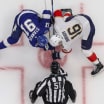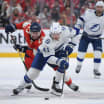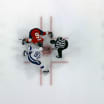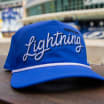The Tampa Bay Lightning last played a regulation hockey game March 10 at Scotiabank Arena in Toronto against the Maple Leafs.
Nearly five months later, following an unprecedented pause and then cancellation of the remainder of the National Hockey League regular season due to the coronavirus, the Lightning are headed back to Toronto to compete in the Stanley Cup Playoffs, their first game that counts coming August 3 against the Washington Capitals at Scotiabank in a round-robin matchup to determine Eastern Conference seeding, 146 days after that last regular season game in the 6.
"We should have just left our stuff there," Rob Kennedy joked.
Inside the logistics of packing for a two month road trip
The Bolts equipment staff has packed over 9000 pounds of gear to fly with the team to Toronto
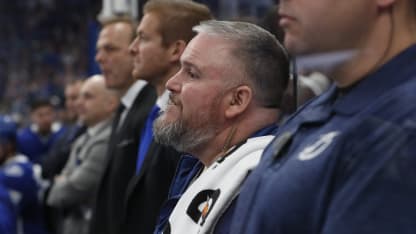
Kennedy is the assistant equipment manager for the Lightning and has a vested interest in where the team's belongings go and how it gets there. He is part of a three-man crew headed by Ray Thill and assisted by Jason Berger tasked with packing the team for what could be 32 games and over two months on the road in Toronto and eventually in Edmonton if the Lightning win their first two playoff rounds and move on to the conference final.
This trip will be unlike any other for Kennedy and his crew. For a typical, four-game road trip in the regular season, they'll bring roughly 6,000 pounds of equipment, from skates, pads, helmets, pants and sweaters for the players to skate sharpeners, medical supplies, video screens, weights, and a massage table, among countless other supplies, for the coaching staff, trainers and equipment crew.
To get to the Toronto bubble, the trip manifest lists over 9,000 pounds of equipment. That's in addition to the four pallets of supplies that have already been shipped to Toronto. A fifth pallet got held at the border in customs for a week before being redirected to Tampa. So that pallet will either have to be reshipped or brought on the team's charter to Toronto too.
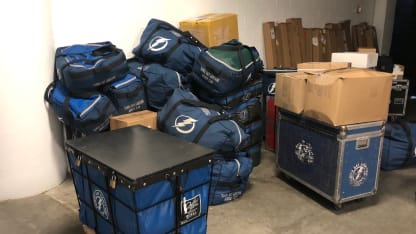
In addition to the normal equipment that comes along with the team on the road, the crew has to account for the fact this isn't a typical trip where the team is moving between multiple cities and arenas over the course of a week. Toronto will be their home base for at least a month. So there's equipment the team would normally have access to at AMALIE Arena or is provided by the host arena while on the road they'll have to bring too, things like a hydrocollator (a stainless steel machine about the size of a dishwasher that keeps hot pads hot) or glove dryers. The team will need to bring four glove dryers: two for the game rink and two smaller ones for the practice rink. Normally, the team would use a glove dryer provided by the host arena. There's one at AMALIE Arena outside the visitors' locker room that visiting teams use when they come through. But because of coronavirus, teams can't share the glove dryers like they normally would.
Each player has their own toiletries bag at the practice and game rinks inside the bubble. Deodorants, body wash, shampoo and hair products are usually laid out in the locker room bathrooms at home, visiting and practice rinks for communal use. But players can't share communal toiletries anymore. Everything has to be personalized, so they'll each get their own bag of products that Kennedy and his crew will set up in the game and practice rinks before each time the team takes the ice.
They'll need to bring plenty of supplements too, individual packed of course so players aren't dipping their hands into one jar and risking contamination.
Kennedy has to figure out everything the team will need in the bubble for two months, everything they'll have access to from the League, equipment they won't have access to because of coronavirus and make sure they have enough of it and nothing gets left behind.
"The biggest difference is the volume of stuff and getting it to Canada," Kennedy said. "If we were in the U.S., shipping something somewhere would be a piece of cake. But because we've got to deal with customs and brokers and stuff like that, shipping stuff to Canada is not a walk in the park."
And if equipment is forgotten or the team runs out of something, it's not easy to resupply because of issues at the border with customs.
Typically, if the team were traveling through the U.S. and needed something, they could have it shipped to the rink they're playing at or the next rink they'll be going to overnight.
"And that could very well happen in Toronto, we could put it in FedEx and you get it in Toronto the next day, but you can't assume something might not get held up at customs," Kennedy said. "That's what happened with the one pallet we shipped beforehand. It got held at customs for a week before we were even notified it was sitting at customs. Then it had to be redirected to Tampa. So, yeah, we can have stuff shipped in, but we've got to be ahead of it. You've got to keep a good eye on what your supplies are."
Kennedy said he and his staff have been planning for the bubble for about six weeks now.
"Once we got to Phase 2 and things started to feel real and this might actually happen," he said. "But there wasn't a whole lot we could do without any official word or even what the protocols or parameters were going to be, where we were going. Over the last two weeks, things kicked into high gear because now we're having Zoom meeting with the rest of the Eastern Conference and League officials. We have an idea what our locker room assignment's going to be at the practice rink, storage space, what the League is providing versus what we need to bring with us."
The team will depart for Toronto at 6 p.m. Sunday. While the players and coaches will head for Hotel X where they will be housed inside the bubble, the equipment staff will immediately head to the practice rink. The Lightning have been assigned three rooms - a players' room, a training/change room and a coaches' room -- inside the Ford Performance Centre, the practice facility for the Maple Leafs and the AHL's Toronto Marlies, for the duration of their time in Toronto. Kennedy sent the League a list of things they would need from the previously-shipped pallets that they'll send over to the practice rink to save the equipment staff an extra stop. They'll hang the player gear at the practice rink and set some of the equipment up the first night. When they return in the morning, they'll get everything organized and make it feel as much like their home practice facility as possible.
"We'll put Lightning signs up and stuff like that and get some homeyness to it and we'll try to leave as much up as we can so we're not constantly moving as much back and forth and stay as efficient as possible," Kennedy said.
Moving into the game rink is a logistical challenge too. There's a set schedule when the staff can move their equipment over to the game rink. For example, the Lightning will play their exhibition game against the Florida Panthers on Wednesday, July 29 at noon. Stuff can be moved into the game rink at 9 p.m. the night prior, allowing League staff time to get the locker rooms cleaned and sterilized. For a 4 p.m. game - both of the Lightning's first two round robin games are at 4 p.m. - stuff can be moved in at 11:30 p.m. the night before. But for an 8 p.m. game, however, teams can't move in until roughly 5 p.m. the day of the game, giving them little time to get set up and settled.
"I'd prefer to not have an 8 o'clock game," Kennedy said, laughing.
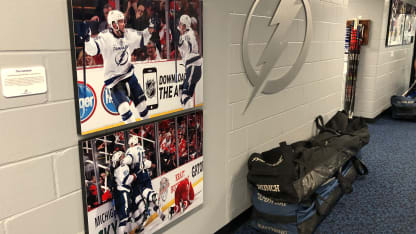
There's one more extra the Lightning are bringing with them to Toronto. As part of the 'All on Board' initiative in the organization's 'Be the Distant Thunder' campaign, fans will have the opportunity to sign the glass that encircles the rink at AMALIE Arena with personalized messages that the team will take with them. That glass is going on the charter too. Kennedy said he's never transported glass before in his 20-plus years as an equipment manager.
"One way or the other, we'll make it fit," he said. "It's great that the fans can get involved and be a part of it. Hopefully whatever they do with it, it makes it on TV so fans can say, 'Hey, I signed that.'"
"We obviously know we're going into a very strange situation, and I think any sort of mementos and little things, little tokens we can remember our fans by, remember our Lightning community by is going to just keep things real I think," Lightning defenseman Kevin Shattenkirk added.
If the Lightning advance to the conference finals and the Stanley Cup Finals, everything will have to be packed up and moved to Edmonton, which will host the last two rounds of the playoffs. The Lightning would head straight from Toronto to Edmonton. They don't get a chance to come home and see family, rest up and resupply. That's because once they're inside the bubble, they'll need to stay there, whether it's the bubble in Toronto or Edmonton, to give the League the greatest chance the playoffs can be completed.
"Even if we finish earlier, say the (Eastern Conference Semifinal) series only goes five games, we may not be able to go to Edmonton (for the Eastern Conference Final) right away because those other series are still going on. There's nowhere for us to go," Kennedy said. "If they don't have anywhere to put us, we might have to stay put in Toronto until it's time to go to Edmonton."
Pulling off the 2020 Stanley Cup Playoffs will be one of the greatest challenges in the history of the NHL. Each team's equipment staff will play a large role in making sure this postseason goes off without a hitch.
For the Lightning's equipment trio, their hard work does not go unnoticed by the players.
"We probably have it the easiest out of everyone involved here," Shattenkirk said. "Everyone is going to be making sure that we're protected and we're safe. But the little details that the equipment staff, the training staff, everyone on our staff, the things they have to go through to make sure that we're protected, it's a laundry list of items. We know that this little training camp we've been already sort of practicing those protocols, but, unfortunately, they're going to be doing a lot extra and they already do plenty for us. It's our job to kind of make it as easy as possible for them, but it's going to be a lot. They know we appreciate everything they do for us, and we certainly will try to make it as easy as possible on them."


